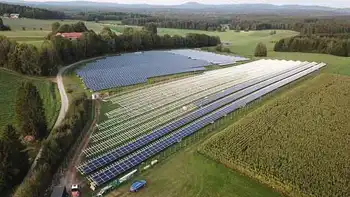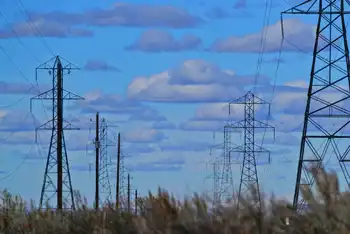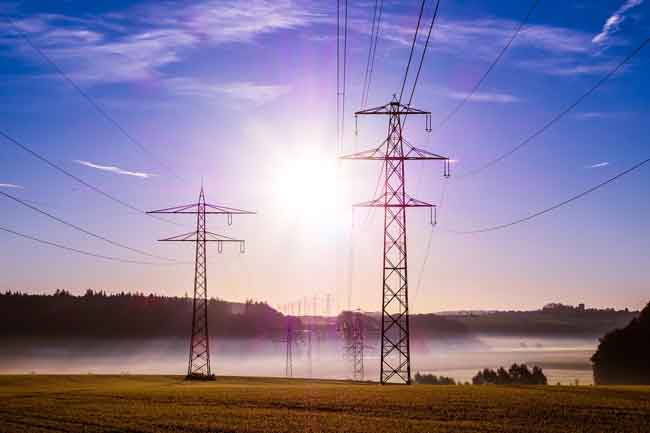SCE completes first commercial rooftop solar installations
By Business Wire
CSA Z462 Arc Flash Training - Electrical Safety Essentials
Our customized live online or in‑person group training can be delivered to your staff at your location.

- Live Online
- 6 hours Instructor-led
- Group Training Available
The project could eventually cover two square miles of existing commercial roofs with 250 million watts of peak generating capacity - equivalent to building several utility-scale solar power plants.
During recent months, the 600,000-square-foot Fontana, Calif., distribution warehouse roof selected as the first installation site has been fitted with 33,700 advanced thin-film solar panels making it the largest single rooftop solar photovoltaic array in California. The facility now generates enough power during peak output conditions to meet the needs of approximately 1,300 Inland Empire homes.
“Here in California, we are taking action to protect the environment by passing laws and setting standards and our companies and entrepreneurs are rising to the challenge,” said Governor Schwarzenegger. “Edison's rooftop plan is the nation's largest solar installation program by a utility, and it is just one example of how private companies are helping us reduce our emissions and meet our renewable energy goals. Projects like this one show the world you can protect the environment and also pump up the economy, and I am proud to say it is happening right here in California.”
“This innovative solar rooftop initiative is a natural extension of our industry leadership in renewable energy,” said Ted Craver, Edison International chairman and CEO. “We are driving solar technology forward and identifying creative new ways to integrate solar power into the electricity grid. A program of this scale could transform solar generation, helping bring costs down and providing us with another important way to meet the environmental challenges of the future.”
SCE officials also announced today the choice of their next solar installation site. The utility will begin construction soon atop a 458,000-square-foot industrial building in Chino, Calif., owned by the Multi-Employer Property Trust, and advised by Kennedy Associates. Additionally, the utility announced that the solar panel supplier for the Fontana installation - First Solar of Tempe, Ariz. - is once again the winning bidder for the utility's second installation.
Decisions have not been made on other building sites.
SCE's renewable energy project, being called a solar power game changer because of its unprecedented scope and consumer price benefits, was prompted by advances in solar technology that reduce the cost of installed photovoltaic generation to approximately half that of current similar installations. Additionally, the utility hopes to fill a gap it has observed in current rooftop solar projects in the state - mid-range one- to two-megawatt installations.
“SCE's is one of the nation's leading utilities. We commend their strategic decision to invest in utility retained generation; this pilot program is sited in the high peak load areas and will provide efficiencies to the grid while creating hundreds of jobs in California,” said John Carrington, First Solar executive vice president of global marketing and business development. ”We are excited to have been awarded the first and second pilots in SCE's commercial solar rooftop installation project and look forward to working together on future opportunities.”
SCE sees numerous benefits to customers, the region and the state from its massive solar project. The program will provide a new generation source to areas where customer demand is rising. The solar modules can be connected directly and quickly to the nearest neighborhood circuit while major new renewable energy transmission lines are being built. Additionally, the output of solar panels generally matches peak customer demand “” lower in the morning and evening, higher in the afternoon.
SCE anticipates its solar power project will create new jobs in Southern California in the solar industry. The International Brotherhood of Electrical Workers, one of SCE's project partners, is supporting the project through the expansion of its solar installation apprentice training program.
SCE's solar project also is designed to supplement several California environmental programs, especially the Go Solar California campaign, which provides incentives to encourage Californians to install solar projects by 2017. The SCE program supports the state's Global Warming Solutions Act, which requires the reduction of greenhouse gas emissions to 1990 levels by 2020, as well as complementing California's renewable portfolio standard, the goal that 20 percent of state's electricity be generated with renewable energy.
The utility received its first regulatory response to the project on September 18, when the California Public Utilities Commission authorized the recording of costs for the first three installations while SCE awaits regulatory review and response to the entire $875 million project due in March 2009.
How It Works:
Solar panels are made of materials that convert sunlight directly into electricity through a chemical process.
• Thin semiconductor layers form an electric field, positive on one side and negative on the other side.
• When sunlight strikes the semiconductor, electrons are knocked loose from the atoms of the material creating the current.
• Wires are attached to the positive and negative sides to carry the electricity from the cell to the device to be powered.











